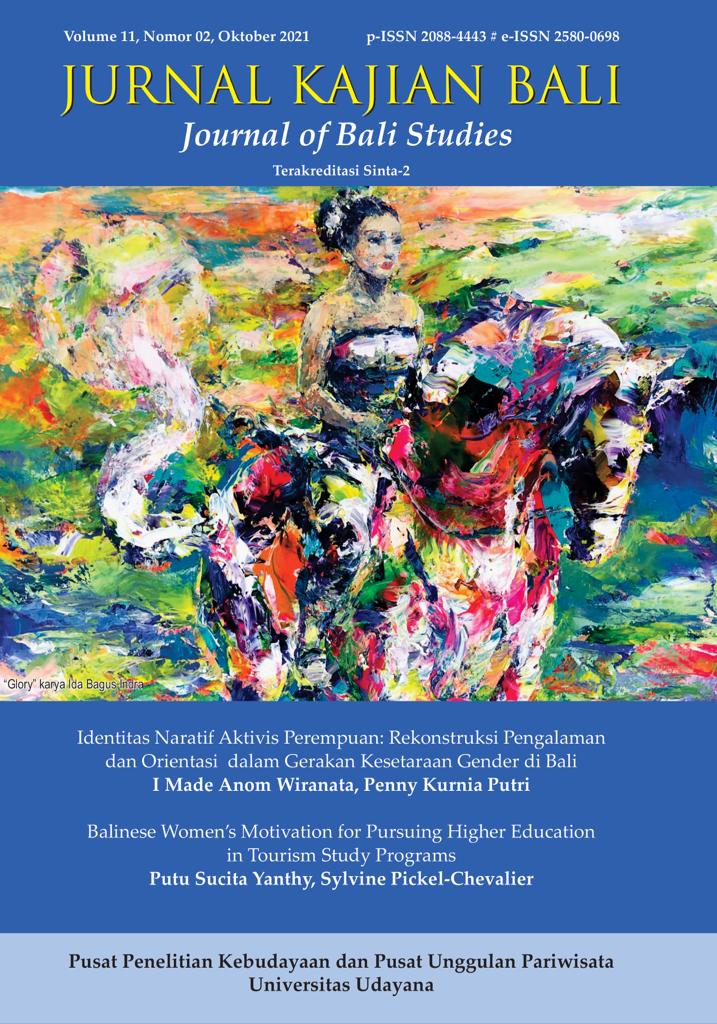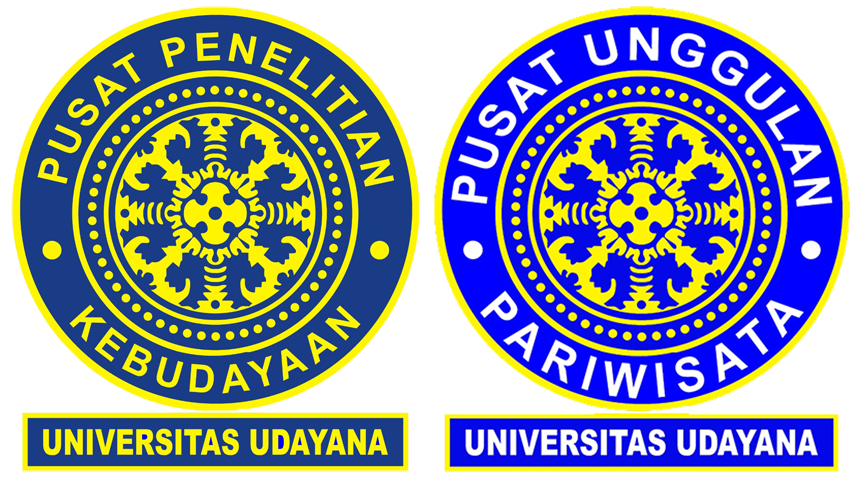Pengembangan Ekowisata Berbasis Masyarakat dalam Perspektif Sustainable Livelihoods di Pemuteran Bali Utara
Abstract
This study aims to analyze the development of Community Based Ecotourism (CBE) in Pemuteran Village, North Bali, in sustainable livelihoods (SL) perspective. The most interesting finding from this study is the central role of a social entrepreneur named Agung Prana who inspired the local community to build knowledge and practice of tourism. Coral reef restoration as the core of ecotourism development in Pemuteran Village. This initiative received broad support from stakeholders, marked by the establishment of local institutions and regulations that support environmental conservation and local economic development. This activity has succeeded in improving the quality of life and maintaining the sustainability of the livelihoods of the local community, despite the change in the focus of the development sector from agriculture to tourism.
Downloads
References
Bottema, M. J. M., & Bush, S. R. (2012). The durability of private sector-led marine conservation: A case study of two entrepreneurial marine protected areas in Indonesia. Ocean and Coastal Management, 61:38–48. doi:10.1016/j.ocecoaman. 2012.01.004
BPS. (2018). Kecamatan Gerokgak dalam Angka 2018 84-90. Badan Pusat Statistik Kabupaten Buleleng: Singaraja.
Brooks, J., M. Franzen, C. Holmes, M. Grote and M. Borgerhoff. (2006).“Testing Hypotheses for the Success of Different Conservation Strategies”. Conservation Biology 20(5):1528-1538.
Charnley, S. (2005). From Nature Tourism to Ecotourism? The Case of the Ngorongoro Conservation Area, Tanzania. Human Organization 64(1): 75-88.
DFID. (2001). Sustainable Livelihoods Guidance Sheets. Department for International Development. London.
Diarta. IK.S. (2016). “Community Based Tourism dalam Pengembangan Ekowisata Terumbu Karang di Pemuteran” dalam Putra, I.N.D. (Ed): Pariwisata Berbasis Masyarakat Model Bali 1-31. Program Studi Magister Pariwisata Universitas Udayana. Denpasar.
Dwiyasa, I.B.P. & Citra, I.P.A. (2014). Partisipasi Masyarakat Lokal dalam Pengembangan Ekowisata di Desa Pemuteran. Jurnal Media Komunikasi Geografi 15(2):29-42.
Gai, A. M., Soewarni, I., & Sir, M. M. (2018). The concept of community poverty reduction in coastal area of Surabaya based on sustainable livelihood approach. IOP Conference Series: Earth and Environmental Science, 137(1). https://doi.org/10.1088/1755-1315/137/1/012099 .
Goodwin, H. & Santilli, R. (2009). Community-based tourism: A success. ICRT Occasional Paper No. 11. URL: http://www.andamandiscoveries.com/press/ press-harold-goodwin.pdf. Diakses tanggal 14 Desember 2019.
Guntur. Murachman, dan Soemarno. 2011. Konsep Pengelolaan Kawasan Konservasi Laut Selat Madura dan Sekitarnya. Agritek. Edisi khusus 122-140
Hidayat A. 2000. Konsep dan Kebijakan Pengembangan Wisata Bahari. Seawatch Indonesia. BPPT. Himateka IPB.
Krismawintari, N.P.D. & Utama, IG.B.R. (2019). Kajian Tentang Penerapan Community Based Tourism di Daya Tarik Wisata Jatiluwih, Tabanan, Bali. Jurnal Kajian Bali, 9(2): 429–448
Mudana, I.W. (2015). Pemberdayaan Masyarakat di Daerah Tujuan Wisata Desa Pemuteran dalam Rangka Pengembangan Pariwisata Berkelanjutan. Jurnal Ilmu Sosial dan Humaniora. 4 (2): 598-608.
Pitanatri, P. D. S. (2012). Pengembangan Marine Tourism Berbasiskan Masyarakat Lokal (Community Based Tourism) di Desa Pemuteran Bali. URL : https://www.academia.edu/13821062. Diakses tanggal 14 Desember 2019
Putra, I.N.D. (2014). “Bali: Between Cultural and Marine Tourism”, Jurnal Kajian Bali, 04(01):15–30.
Salafsky, N. and R. Margoluis. (1999). “Threat Reduction Assessment: a Practical and Cost- Effective Approach to Evaluating Conservation and Development Projects”. Conservation Biology 13(4): 830-841.
Salafsky, N., H. Cauley, G. Balachander, B. Cordes, J. Parks, C. Margoluis, S. Bhatt, C. Encarnacion, D. Russell and R. Margoluis. (2001). “A Systematic Test of an Enterprise Strategy for Community Based Biodiversity Conservation”. Conservation Biology 15(6): 1585-1595.
Saragih, S., Lassa, J., & Ramli, A. (2007). Kerangka Penghidupan Berkelanjutan Sustainable Livelihood Framework. 1–31. URL: https://www.zef.de/ uploads/tx_ zefportal/Publications. Diakses tanggal 14 Desember 2019.
Sardiana, IK. & Purnawan, N.L.R. (2015). “Community-based Ecotourism in Tenganan Dauh Tukad: An Indigenous Conservation Perspective”, Jurnal Kajian Bali, 05(02): 347-368.
Science, E. (2018). Developing community-based mangrove management through eco-tourism in North Sumatra, Indonesia. URL : https://doi.org/ 10.1088/1755-1315. Diakses tanggal 14 Desember 2019.
Serrat O. (2017) The Sustainable Livelihoods Approach. In: Knowledge Solutions. Springer, Singapore. URL : https://doi.org/10.1007/978-981-10-0983-9_5.
Stone, M. T. 2015. Community-based ecotourism: A collaborative partnerships perspective. Journal of Ecotourism, 14(2–3):166–184.
Suwena, I.K dan Arismayanti, N.K (2016). “Pengembangan Pariwisata Hijau sebagai Upaya Pemberdayaan Masyarakat di Desa Pemuteran Kabupaten Buleleng Bali”, Seminar Nasional Sains dan Teknologi (Senastek), Denpasar Bali.
Wigati, S. dan Fitrianto, A. R. (2013). “Pendekatan Sustainable Livelihoods dalam Rangka Membongkar Dominasi Tengkulak Melalui Kegiatan Keagamaan di Desa Luworo Kecamatan Pilang Kenceng Kabupaten Madiun”, Jurnal Dakwah, 14(2):283-310.
Zeppel, H. (2005). Indigenous ecotourism: Sustainable development and management. Ecotourism Book Series.

This work is licensed under a Creative Commons Attribution 4.0 International License.



















